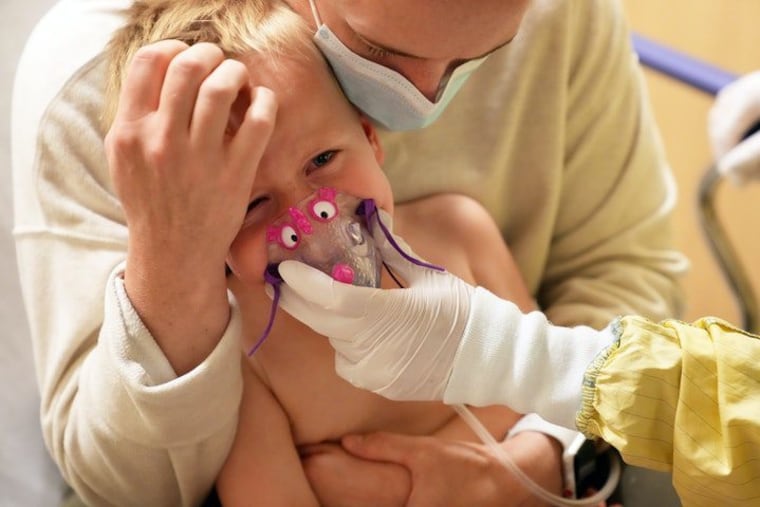RSV has parents ‘freaking out.’ Can you blame them?
First-time parents are experiencing the normal deluge of illness while coping with the aftershocks of a deadly pandemic and headlines screaming about a crisis in pediatric care. It's all too much.

I’ve been sick for a month. Same with almost everyone I know.
Now that schools and most other places are mask-free, infections have rebounded in a major way. It’s a mix of COVID-19 and other viruses, but the virus in the news lately is RSV, or respiratory syncytial virus. It’s a typical feature of colder months, but can be dangerous for the very young or very old. Even the flu has already reached epidemic proportions — it kicked off early this year, and the Centers for Disease Control and Prevention estimated that it has already killed more than 700 people.
For the past few weeks, headlines have screamed about the deluge of illnesses kids have been hit with. We’re facing the “worst pediatric-care crisis in decades,” read a headline in the Atlantic. “This is our March 2020,” the medical director of the pediatric intensive care unit at Johns Hopkins Children’s Center told the New York Times. Schools are closing or going remote due to widespread illness. Comedian Amy Schumer missed rehearsals for Saturday Night Live this week because her 3-year-old son was in the ER for RSV. Parents are posting videos of their kids struggling to breathe (I’d avoid watching those, if you can).
Philadelphia hasn’t been spared: Sage Myers, a pediatric emergency medicine doctor at Children’s Hospital of Philadelphia, tweeted last week after an overnight shift in the pediatric ER that whatever we’re hearing about RSV and other viruses, “it’s 1000 times worse.”
What’s more, viruses like the flu and COVID are expected to become even more prevalent through the winter.
So if you know any first-time parents of young kids, be kind to them right now. They are probably freaking out.
It’s hard to explain just how terrifying those first months with an infant are like. As a new parent, you have been given the most important job in the world with zero training. You have to make constant decisions that feel like life or death while being so sleep-deprived that it feels like a violation of the Geneva Conventions.
My kid is now almost 9 years old, and I still have visceral memories of those early days. She was born at the end of December and struggled to gain weight — a condition cruelly dubbed “failure to thrive” — so every health provider drilled into me that I couldn’t let her get sick. They told me to stay at home as much as possible, wipe down surfaces, and don’t let anyone touch her without washing their hands (or ideally changing their clothes). Even with all that, she got a stomach bug when she was a few months old and lost some weight. I still think about that.
So yes, it did feel like March 2020 — only it was in early 2014, when the idea of a global pandemic was the stuff of movies and books, not real life.
Just think: Parents of tiny babies conceived and gave birth during the backdrop of this unprecedented, unimaginable event that killed millions of people. We’re all still shell-shocked from the pandemic. Now, many of these little babies and toddlers, who have been ensconced at home for months to avoid a deadly virus, are starting day care for the first time. So of course they are getting sick. My daughter started day care in June 2015, when hardly anyone was getting sick, and came down with ringworm and hand, foot, and mouth disease within the first week. At one point, her fever went up to 105.9.
“We’re all still shell-shocked from the pandemic.”
That was scary enough, without seeing headlines of a crisis in childhood infections, where babies wait for hours to be seen at pediatric hospitals, or get transferred out of state because there is no more room.
Katie Lockwood, a pediatrician at CHOP Flourtown (where I visited for weekly weight checks during my kid’s first few months of life), told me that she doesn’t worry about the increase in RSV — “we are well equipped to handle RSV” — but she does feel for the parents calling her office at all hours in a panic, who often have to wait a while for a response. For many of them, this may be the first time their child has gotten sick, she said, and they don’t know what to worry about. Colds can make a child’s breathing noisier and more labored; so when is it cause for concern? (The American Academy of Pediatrics has some advice on distinguishing between colds and RSV breathing that requires medical care.)
Yes, most of her same-day appointments right now are kids with respiratory issues, and many hospitals are filling up, but any child who is having trouble breathing is given priority. “We see the kids who really need to be seen first,” Lockwood told me.
In the meantime, Lockwood suggested a series of “trivial interventions — but they work,” similar to the advice I received when I was trying to get my underweight baby through the winter months: wash hands, use a cool-mist humidifier, and wipe down high-touch surfaces such as pacifiers and bottles, especially after coming home from day care.
I have no words of wisdom for terrified parents, just commiseration. One day, I hope all of this will be just a memory for you — albeit a visceral one.